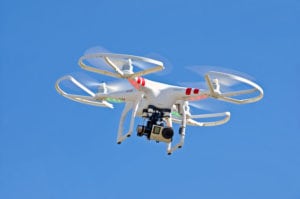
38096715 – white drone hovering in bright blue sky
A new law criminalizing certain drone activities, including “drinking and droning”, was signed by Governor Christie before he left office. The text of the law reads:
1. As used in this act:
“Operate” means to fly, control, direct, or program the flight of an unmanned aircraft system.
“Unmanned aircraft” means an aircraft that is operated without the possibility of direct human intervention from within or on the aircraft.
“Unmanned aircraft system” means an unmanned aircraft and associated elements, including communication links and the components that control the unmanned aircraft, that are required for the pilot in command to operate safely and efficiently.
b. Except as otherwise prohibited, a person who is authorized by federal law to operate an unmanned aircraft system may operate an unmanned aircraft system in this State for any purpose, provided that the person operates the unmanned aircraft system in a manner consistent with applicable federal law and regulations. Nothing in this section shall be construed to affect federal preemption of State law regarding aviation.
For purposes of this subsection, “person” means an individual, partnership, corporation, association, governmental entity, or other legal or commercial entity.
c. An owner or operator of a critical infrastructure, including a political subdivision, may apply to the Administrator of the Federal
Aviation Administration, pursuant to section 2209 of the “FAA
Extension, Safety, and Security Act of 2016,” Pub.L.114-190, to prohibit or restrict the operation of unmanned aircraft systems near the critical infrastructure.
Prior to applying to the Administrator of the Federal Aviation Administration to prohibit or restrict the operation of unmanned aircraft systems close to a critical infrastructure, a political subdivision shall hold a minimum of one public hearing, with adequate notice to the public, concerning the proposed application.
1. The text of the law begs the question: What is “a critical infrastructure” or a political subdivision of a critical infrastructure? Anyone who values their privacy and wants to limit the ability of drone operators to watch and record them would be interested in restricting the ability of drone operators to invade their privacy. Unfortunately, the term “infrastructure” generally applies to pubic entities and private businesses related to buildings, roads, and power supplies, as opposed to private residences. Thus, the new drone law protects essential services as opposed to privacy.
